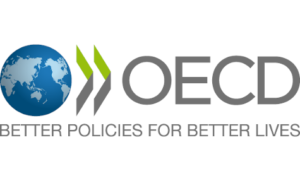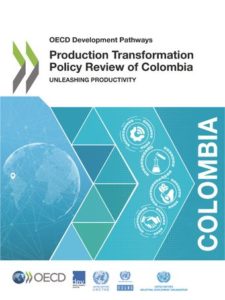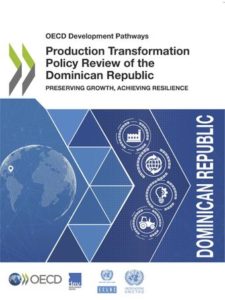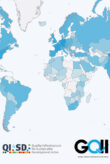In 2020 correspondence took place between Dr. Marion Stoldt, Head of the PTB’s International Cooperation Department, and Dr. Annalisa Primi, Director of the OECD Development Centre’s Structural Politics and Innovation Department. Per this correspondence, closer cooperation between the PTB and the OECD Initiative for Political Dialogue on Global Value Chains, Production Transformation and Development was agreed upon.
What is the OECD, and what is the significance of developing and emerging countries have within it?
The Organisation for Economic Cooperation and Development (OECD) was founded in 1961. It considers itself as lying at the core of international cooperation, and acts as a discussion forum and a kind of think tank for global economic and social development. It does so against a backdrop of changing conditions like the climate change crisis, the energy crisis, digitalization, the consequences of the Covid-19 pandemic and other upheavals. The OECD currently has 37 member states including Chile, Mexico and (since 2019) Colombia. Costa Rica is the next upcoming candidate for membership. The Secretary-General of the OECD is Angel Gurría, Mexico’s former Finance Minister.
Though the OECD is often thought of as a coalition of industrialized nations, it is also open to developing and emerging countries. It was clear early on that the OECD’s vision – Better policies for better lives – cannot be brought to fruition without these countries’ involvement. Hence the OECD Development Centre, OECD Dev started its operations back in October 1962. The OECD Dev membership base currently comprises 27 OECD member states, 29 developing and emerging countries and the European Union.
What is the remit of the OECD Initiative for Political Dialogue on Global Value Chains, Production Transformation and Development?
The OECD Initiative for Political Dialogue on Global Value Chains, Production Transformation and Development came about upon a recommendation from Costa Rica, and has been working under the auspices of OECD Dev since 2013. It is a transversal working group, meaning that it works in close cooperation with other OECD directorates and committees. It currently has 18 member states, see table. Its work is also open, on an equal basis, to all other developing and emerging countries in Africa, Asia and Latin America. The governing body comprises the representative of Costa Rica as President, Annalisa Primi, OECD and the representatives of Chile and Morocco.
Member states of the OECD Initiative for Political Dialogue
| Chile
Colombia Costa Rica Dominican Republic Egypt |
Ethiopia
France Japan Republic of Korea Malaysia |
Mexico
Morocco Panama Paraguay Peru |
Turkey
UK Uruguay |
The OECD Initiative is a platform for the exchange of learning experiences, on which best practices and lessons learnt are presented and discussed, and corresponding recommendations made. Its aims are as follows:
- Supporting developing and emerging countries in the development of innovative political solutions to promote sustainable development, reduce poverty and improve peoples’ quality of life
- Facilitating political dialogue between governments whilst involving public-sector, private-sector and humanitarian actors
 The OECD Initiative is aimed primarily at the political scene, meaning governments of developing and emerging countries, but also at the private sector. Accordingly, it is comprised of the following participants:
The OECD Initiative is aimed primarily at the political scene, meaning governments of developing and emerging countries, but also at the private sector. Accordingly, it is comprised of the following participants:
- High-ranking government representatives: department heads within the offices of heads of state or within line ministries, who are known as sherpas. Where the presentation of important analyses is concerned, also ministers and deputy ministers
- Representatives of the international donor community and of implementing organizations
- Representatives of the private sector, like industry associations, chambers of commerce and banks
- Experts (scientists and practitioners)
The most important working instruments are:
- The Peer Learning Group (PLG), which carries out productive transformation policy reviews (PTPR) at the given country’s request
- Half-yearly OECD Initiative meetings during which experiences with global value chains, digitalization, Industry 4.0, financing instruments and other relevant problems can be discussed
- Development of guidelines and studies on the generalization of learning experiences
How did the cooperation with the OECD Initiative come about?
In 2017-18, when Colombia was about to be admitted into the OECD, a PTPR was carried out on the country at the request of its government. The national planning office DNP, short for Departamento Nacional de Planeación, part of the Colombian President’s office, had been in contact with the PTB for years, and valued its experience spanning more than 40 years when it came to building up a demand-oriented quality infrastructure in the country. The DNP asked Annalisa Primi to invite the PTB to advise on the draft PTPR with a contribution on the development status of the Colombian quality system Subsistema Nacional de la Calidad, SICAL for short, and the challenges that lay ahead. Annalisa Primi was already familiar with the PTB thanks to her previous position at the UN Economic Commission for Latin America and the Caribbean, ECLAC, and agreed immediately. The PTB’s contribution was seen as a valuable one, because it came with very important down-to-earth recommendations. Essential parts of it were incorporated into the Colombia PTPR and also into Colombia’s 2018-2022 national development plan.
Why is cooperation with the OECD Initiative advantageous for the PTB’s International Cooperation Department?
The quality infrastructure of most OECD member states has grown up “organically” over more than 100 years. In developing and emerging countries, however, there is less awareness of its significance, which is often underestimated in policy. The line-up of those in charge of quality infrastructure within the relevant ministries changes following every government reshuffle, if not more often. Senior management positions within state-owned quality infrastructure institutions are often filled on the basis of political considerations rather than professional competence. At the same time, there is a rift between quality infrastructure institutions on the one hand and industry on the other. Small and medium-sized businesses, in particular, view quality assurance expenditure as an expense rather than an investment.

Working methodology of the OECD Initiative
For the PTB’s International Cooperation Department, the OECD Initiative is an advantageous forum. It would like to promote the sharing of experiences >evidence-based< and their application >better policies< in line with conditions in each country (see diagram). In an open and relaxed atmosphere, it is possible to put the development of demand-oriented quality infrastructure, and its significance for sustainable development, on the agenda of issues up for debate. Participants’ interest in them can be piqued with persuasive arguments and examples. In this respect, the focus is not so much on specific technical issues, but rather on the effects of well-developed quality infrastructure on economic and social development, or the negative consequences if quality infrastructure is only patchy.
The PTB’s aims for more stable cooperation with the OECD Initiative consist of:
- Raising awareness among OECD Initiative participants of the fact that sustainable social and economic development also calls for adequate quality infrastructure. It also requires the provision of state budget funds
- Promoting the exchange of experience and networking between developing, emerging and industrialized countries in the quality infrastructure field, for business restructuring, social development and the configuration of national, regional and global value chains
Via the OECD Initiative, the PTB hopes to assist its partner organizations in developing and emerging countries to forge long-term, fruitful ties with the political decision-makers who decide on the further expansion of metrology, standardization, accreditation and conformity evaluation.
What has been undertaken so far, and what plans are in place for the future?
So far, the PTB has engaged in the following:
- Participation in PLG meetings on Colombia, the Dominican Republic and Egypt with presentations on the current status of quality infrastructure and the challenges that it is currently facing. The contributions went straight into the PTPRs of both countries
- Participation in the 11th and 13th plenary meetings of the Initiative, in Paris in 2018 and in Cairo in 2019, with both prepared and ad-lib brief contributions
- Upon a suggestion from the OECD Initiative, the writing of a blog post on the challenges posed to quality infrastructure in developing and emerging countries by the COVID-19 crisis
The participation in the various events was well received, and allowed first contact to be made with government and private-sector representatives in Chile, the Dominican Republic, Colombia, Paraguay, Lebanon and Egypt as well as the ECLAC and the European Development Bank, EBRD.
The plans for the future are as follows:
- Assisting the PLG in putting the PTPR together, with contributions on quality infrastructure and its further expansion. This could involve the use of the Rapid Diagnostic Toolkit developed by the World Bank and the PTB
- The OECD Initiative has expressed interest in developing principles for effective quality infrastructure management
- Putting together studies on subjects such as the demands of digitalization, Industry 4.0, food safety and the consequences of Covid-19 on quality infrastructure


The PTPRs on Colombia and the Dominican Republic respectively, each containing a detailed description of quality infrastructure.
Images © OECD Initiative for Policy Dialogue on Global Value Chains, Production Transformation and Development








